Britain’s hottest year EVER: 2022 WILL be the UK’s warmest on record despite the first half of December being the coldest for over a decade, Met Office says
- Provisional data puts 2022 as the warmest year in the UK since records began
- The Met Office has blamed the ‘persistence of warmer than average conditions’
- This is despite 2022 having the coldest first two weeks of December since 2010
2022 will turn out to be the warmest year on record for the UK, the Met Office has said, despite the first half of December being the coldest for over a decade.
The average temperature for the whole of this year is on track to beat the previous all-time high of 49.7°F (9.88°C) set in 2014, the provisional data shows.
The exact figure will be confirmed in the new year, but the Met Office is confident 2022 will set a new 139-year annual mean temperature record.
It has blamed the ‘persistence of warmer than average conditions’ throughout the year, while the record-breaking heat waves in July also bumped up the average.
2022 is set to be the UK’s warmest on record, according to provisional figures released by the Met Office. Pictured, parched grass in Hyde Park in London on July 19, 2022 – the UK’s hottest day of the year and hottest day on record
1. 2014 – 49.78°F (9.88°C)
2. 2006 – 49.46°F (9.7°C)
3. 2020 – 49.31°F (9.62°C)
4. 2011 – 49.29°F (9.61°C)
5. 2007 – 17.20°F (9.56°C)
6. 2017 – 49.15°F (9.53°C)
7. 2003 – 49.04°F (9.47°C)
8. 2018 – 49.01°F (9.45°C)
9. 2004 – 48.99°F (9.44°C)
10. 2002 – 48.99°F (9.44C)
(2022 is expected to top this list, displacing 2014)
Dr Mark McCarthy, head of the Met Office National Climate Information Centre, said the data is ‘in line with the impacts of human-induced climate change’ – and that the average will likely get higher in the next few years.
‘2022 is going to be the warmest year on record for the UK,’ Dr McCarthy said.
‘Although it doesn’t mean every year will be the warmest on record, climate change continues to increase the chances of increasingly warm years over the coming decades.’
Met Office told MailOnline that the figure for 2022 will likely be around 18°F (10°C), although it is still being determined.
It will be available by the end of the year, but then subject to a verification process.
If the provisional data is correct, 2022 will sit at the top of the list of highest UK average temperature since records began in 1884.
Currently, the years making up that list are, in order, 2014, 2006, 2020, 2011, 2007, 2017, 2003, 2018, 2004 and 2002.
Met Office also said UK temperatures in 2022 remained above average for every month of the year except December, which has been cooler than average so far.
2022 has seen the coldest first two weeks of December since 2010 – an ‘anomalously cold start’ to the month.
Since records began in 1884, all 10 years that have the highest annual UK temperature have occurred since 2003
UK’s record breaking summer
On July 15, the Met Office issued its first ever red alert warning for extreme heat, for period between July 18-19 in parts of England.
On July 19, Coningsby, Lincolnshire set a national record when temperatures hit 40.3°C (104.5°F).
This was 1.6°C (2.8°F) warmer than the previous record and 3.6°C (6.4°F) hotter than the record that had stood until 1990.
Wales also recorded a new daily maximum temperature record of 98.7°F (37.1°C), while Scotland saw a new record of 94.6F (34.8°C).
‘While many will remember the summer’s extreme heat, what has been noteworthy this year has been the relatively consistent heat through the year, with every month except December being warmer than average,’ Dr McCarthy said.
A sequence of heatwaves starting in June this year led to the UK experiencing its fourth warmest summer on record (behind the summers of 2018, 2006 and 2003), as well as the hottest UK temperature ever recorded.
In the UK, temperatures broke the 40°C mark for the first time, hitting a new record of 40.3°C (104.5°F) on July 19 at Coningsby in Lincolnshire.
This was 1.6°C (2.8°F) warmer than the previous record and 3.6°C (6.4°F) hotter than the record that had stood until 1990.
Wales also recorded a new daily maximum temperature record of 98.7°F (37.1°C), while Scotland saw a new record of 94.6F (34.8°C).
Met Office said all four seasons in 2022 were in the top 10 warmest on record for the UK.
In response to the newly-revealed data, a spokesperson for Greenpeace said ‘these aren’t the kind of records you want to be breaking’.
The Met Office annual global temperature forecast for 2023 suggests that next year will be one of the Earth’s hottest years on record. It follows record-breaking temperatures in 2022. Pictured, a paddle boarder makes their way through the sea in Avon Beach in Dorset this year
‘While some newspapers were celebrating the summer sizzler, many of us felt a creeping dread when we saw the scorched brown earth of the heatwave,’ said Rebecca Newsom, head of politics at Greenpeace UK.
‘This isn’t an abstract thing – people around the world are already suffering the devastating consequences of climate breakdown, despite having done little to cause it, like the severe flooding in Pakistan.’
Only last week did the Met Office say that 2023 will be one of Earth’s hottest years on record globally.
The average global temperature for 2023 is forecast to be 2.16°F (1.2°C) above the average for the pre-industrial period (1850-1900), it said.
However, 2023 is unlikely to top the record set in 2016, when global temperatures were 2.3°F (1.28C) above pre-industrial levels.
Read similar stories here…
Climate change made heatwave 10 times more likely, study suggests
Countries pledge to protect 30% of world’s lands and seas by 2030
Climate change means Chardonnay could be grown near Birmingham
Global temperatures above the pre-industrial average since the turn of the century
2021: 1.99°F (1.11°C)
2020: 2.28°F (1.27°C)
2019: 2.23°F (1.24°C)
2018: 1.99°F (1.11°C)
2017: 2.14°F (1.19°C)
2016: 2.3°F (1.28°C)
2015: 2.07°F (1.15°C)
2014: 1.8°F (1°C)
2013: 1.69°F (0.94°C)
2012: 1.63°F (0.91°C)
2011: 1.56°F (0.87°C)
2010: 1.8°F (1°C)
2009: 1.65°F (0.92°C)
2008: 1.42°F (0.79°C)
2007: 1.63°F (0.91°C)
2006: 1.63°F (0.91°C)
2005: 1.72°F (0.96°C)
2004: 1.44°F (0.8°C)
2003: 1.58°F (0.88°C)
2002: 1.6°F (0.89°C)
2001: 1.45°F (0.81°C)
2000: 1.2°F (0.67°C)
Source: Met Office
Source: Read Full Article





